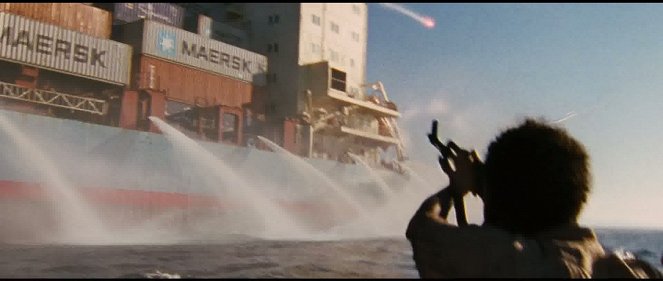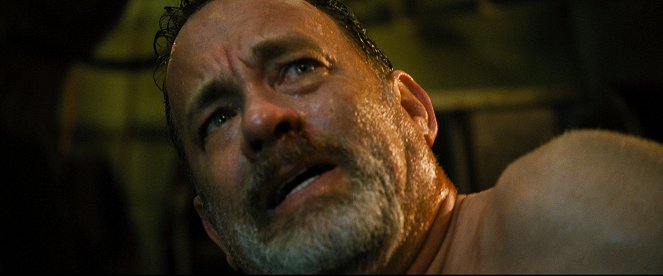Directed by:
Paul GreengrassScreenplay:
Billy RayCinematography:
Barry AckroydComposer:
Henry JackmanCast:
Tom Hanks, Catherine Keener, Barkhad Abdi, Barkhad Abdirahman, Faysal Ahmed, Mahat M. Ali, Michael Chernus, David Warshofsky, Corey Johnson, Chris Mulkey (more)VOD (4)
Plots(1)
Captain Philips is based on the real-life 2009 hijacking of the container ship Maersk Alabama by Somali Pirates. The film is breathlessly directed by British film-maker Paul Greengrass, who manages to produce at one and the same time a gripping, terse thriller and a geopolitical vignette of the effects of globalisation in the Horn of Africa. Greengrass singles in on the interactions between Captain Richard Philips (Hanks) and hijacker Abduwali Muse (debutant Barkhad Abdi) during the thrilling stand-off. (Sony Pictures Home Entertainment)
(more)Videos (7)
Reviews (15)
A superb dramatization and high-octane exhibition of filmmaking adrenaline that once again elevates pseudo-documentary realistic authenticity to a full-blown blockbuster experience. Although Greengrass goes about this unlike anyone from the numerous rows of his many "copy & paste" colleagues, it's a bit of a safe bet on his part, with the camera looking over his shoulder and whizzing between faces just long enough for you to know who he's thinking of. It's not boring at all, but it does last about fifteen minutes longer than audiences would like. Then it would be a fuller experience. And let's face it, when was the last time you saw a Navy SEALS presentation this short and impactful? PS: Hans Zimmer is thanked in the credits, but as the central motif unfolded, I kept subconsciously waiting for the black hood to appear. 4 ½.
()
Is Captain Phillips a glorification of the status quo and a civilian hero? I don’t think so. A comparison with Lindholm's A Hijacking is entirely relevant, but we should not automatically claim that the Danish "harder, colder, and non-hero" interpretation of reality is "better". A material comparison of starting points is interesting: The Danes choose a typical situation, whilst the Americans a dramatic and spiraling situation. The protagonist of A Hijacking is an ordinary sailor who is a passive "commodity" in negotiations, the hero of Greengrass's film is already picked up and belongs to the active movers (he is a captain and actively fights for his life almost to the last moment). The American version is actually two-thirds characterized by shifts, actions and reversals, while the Danish version completely avoids them and captures the routine of negotiations that drag on callously. The Danes film in the affected area and let the whole crew live in uncertainty (because they also want to transfer the rawness to the film), whereas the Americans use the calm waters around Malta. These are two approaches to the same topic, I see no reason to hierarchize them - both are completely legitimate. In addition, they both create a very similar picture: a broken individual and a system that continues to function as if nothing had happened. We can certainly perceive Captain Phillips as a celebration of the Navy Seals and the US Army, but Greengrass gives enough clues to the counter-interpretation - the whole situation is absurd, disproportionate and unsolvable (a small orange boat vs. three warships), and both sides happen to have legitimacy. The fact that he is monitoring Phillips and his future captor in parallel should alert us that Greengrass wants to do more than just paint a thrilling case. Similarly to Zero Dark Thirty, here, it is as if more clues seem to tempt to the conventional satisfaction that the disgusting skinny people will get their assess kicked, yet the action only provides spectator satisfaction to a limited extent. There is a disturbing array of free motifs that Greengrass surrounds with his millimeter-accurate direction. My view is more in line with Lindholm's, but that doesn't mean Captain Phillips didn't get to me in the end. It only happened during the penultimate scene, but it was worth the wait. [80%]
()
It’s fine to see Hanks acting again, even though in the second half he is more like an extra. Although this nerve-racking voyage loses tension a little in the slower, middle section, this is a minor flaw on an otherwise thrilling depiction of past events. This time Greengrass makes excellent use of the camera - shaky Somali vs. calm Yankee-Irish style. Wonderfully heated confrontations, the Somalis are great to a man and the movie is just dripping with authenticity. The finale where the US Navy arrive is a heavy-caliber military display (even my better half acknowledged the majestic beauty of the warships). Greengrass has certainly made more charged and even better movies, but it didn’t receive that stamp of humanity until Hanks got involved. If it weren’t for United 93, I would give it full marks.
()
United 93 draws on the worldwide echo of September 11th, Green Zone on the trauma of the Iraq war, and I do like the character of Agent Bourne, but if I had to answer the question of which Greengrass film I value the most, I wouldn't hesitate for even a second. Captain Phillips combines a strong and sympathetic hero, a dramatic situation, awareness of artistic reconstruction of real events, and last but not least, the presence of a dangerous opponent in the form of a pirate captain. The cinematography is clear this time, and the director moves from the spacious cargo ship to the claustrophobic environment of the rescue boat at the right time. The story focuses on the depiction of a specific case of maritime piracy, but it also says something about the phenomenon of banditry on the shores of Somalia, about senseless regulations that bind merchant ships, and about the fact that every phenomenon has its background, and pirate crews, with their dependence on clan leaders and existing poverty, actually have no choice. Tom Hanks was born for this role, and I find no weaknesses in the film that are worth mentioning. Overall impression: 90%.
()
Paul Greengrass today has no competition in this type of intimate action movies based on real events. This one is incredibly tense and with a frantic pace (thanks to the camera and the editing), even in those scenes where basically nothing is happening and the characters are just talking (which is most of the film, really). And the emotional climax will give you the final KO. No doubt, one of the best films of the year.
()



Ads